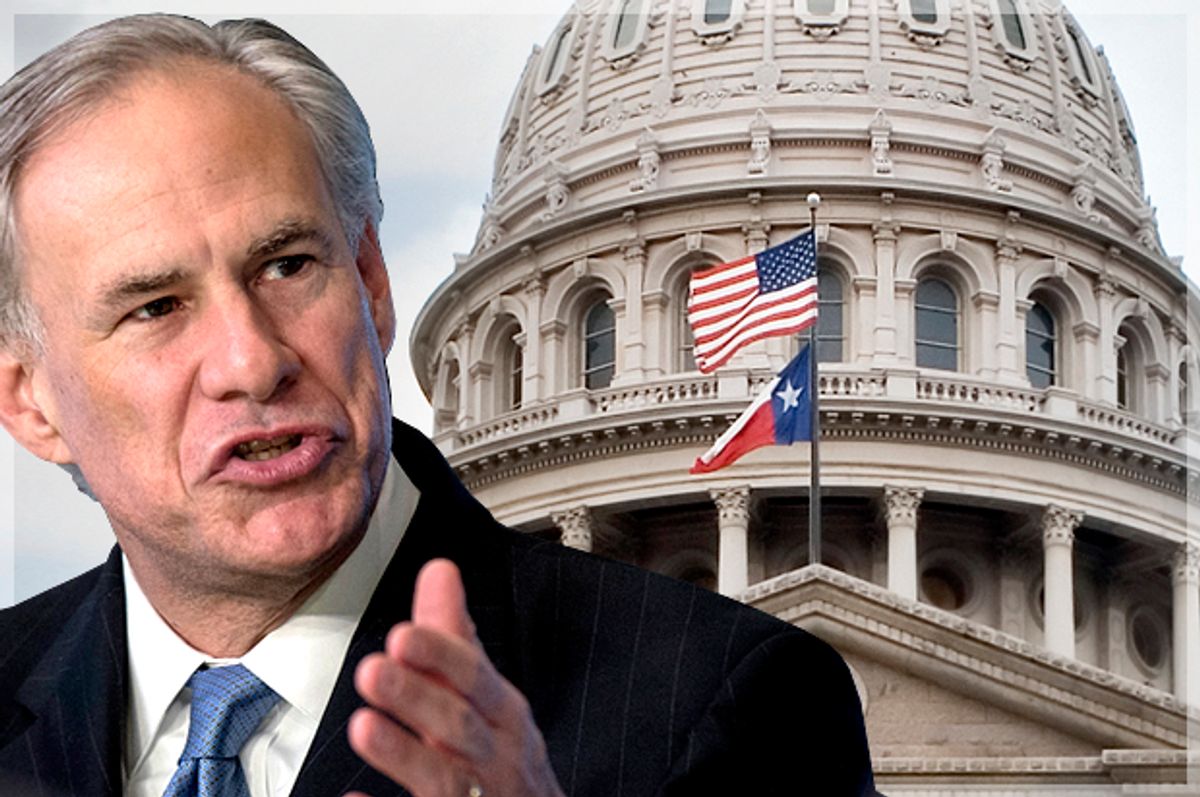Famed political humorist Molly Ivins liked to call Texas the "National Laboratory for Bad Government," which is why the nation as a whole should look with trepidation at the events that transpired last week in the state legislature. While the national press was riveted — for good reason! — by the ongoing scandal surrounding President Donald Trump's firing of FBI Director James Comey, the Texas legislature upped the ante when it comes to destroying the government in the name of right-wing ideological purity.
In sum, the self-described "Freedom Caucus" in the Austin legislature, claiming that the Republican-controlled body is somehow not conservative enough, decided to go on a bill-blocking spree at the end of last week, using procedural machinations to run out the clock for more than 100 bills, effectively killing off those bills.
The event was dubbed the "Mother's Day Massacre" by observers. It's a nickname that had an uncomfortably literal side to it, as two of the bills that were killed off with delaying tactics were meant to address Texas' alarming maternal mortality rate, which doubled from 2011 to 2014, making the state's maternity mortality rate the highest in the developed world.
[jwplayer file="http://media.salon.com/2017/05/fc16efa4e16cb1e06bbe0362889c12a1.mp4" image="http://media.salon.com/2017/05/b887cf4a31b20a87618c3cd604f42151-1280x720.png"][/jwplayer]
It wasn't just mothers who were victims of the Freedom Caucus stunt. Multiple bills meant to help children were decimated as well, including one aimed at protecting children from sexual predators, legislation intended to stop schools from shaming children who don't have lunch money and a bill to encourage early literacy.
The caucus members were angry because the House's leadership, which is also dominated by conservative Republicans, caused the demise of a handful of Freedom Caucus-friendly bills covering a range of far-right hobbyhorses, including attacks on abortion rights and public schools. In response the caucus killed dozens more bills.
It's not easy to write a bill that's so radical in its right-wing politics that it ends up being rejected by the Texas branch of Republican Party, a point that GOP state Rep. Dennis Bonnen emphasized to the Austin American-Statesman. "So ‘sanctuary cities’ is not a conservative issue for them?" Bonnen complained, referring to a bill signed into law on May 7 by Gov. Greg Abbott that is so racist and oppressive that the American Civil Liberties Union had to issue a travel advisory warning people who might be perceived as immigrants about the dangers of harassment and illegal detention by the police. Caucus member Rep. Jeff Leach said, after watching the killing of a handful of radical right-wing bills: "We’ve learned time and time again, when a bully punches you again and again and again. You can walk away. You can be kind. But sometimes you got to punch back.”
This behavior by the Texas Freedom Caucus suggests that the newly hardened far right of the Republican Party is not merely not going away, but it may be more willing than ever to use the tactics of blackmail to try to turn the red states — and eventually the country — into a "Handmaid's Tale"-style dystopia of their dreams.
A version of this, of course, has been happening on the national level, as the Freedom Caucus of the House of Representatives was able to push the American Health Care Act, also known as "Trumpcare," even further to the right through obstructionist politics. These hardball tactics resulted in a bill that would strip away coverage mandates, slash Medicaid and allow discrimination against people with pre-existing conditions.
It's hard not to see the Lone Star State's version of the Freedom Caucus as an escalation of this strategy. This isn't just about changing one bill or even a handful of bills; it's about demanding that the Republican Party move even further to the right and at an even more breakneck speed than before.
The anger that the Republicans aren't moving hard enough or fast enough to the right is doubly alarming when one considers how far the party has already traveled. Political polarization has been a major political trend over the past few decades, but most of the shift is due to Republicans stampeding rightward. Yes, it's also true that Democrats have become more liberal, at least on social issues. But as Nolan McCarty of The Washington Post explained in 2014, "Despite the widespread belief that both parties have moved to the extremes, the movement of the Republican Party to the right accounts for most of the divergence between the two parties."
To be clear, the Texas legislature's Freedom Caucus didn't succeed, in the short term anyway, with its temper tantrum. Its too-far-right-for-Texas bills didn't end up being reinstated on the legislative calendar and the caucus' members aren't going to get a debate on them, much less a vote. But the caucus did manage to derail all other business in the legislature, and it's hard to not notice that a lot of the dead bills dealt with issues that will get you called a "snowflake" on social media for caring about them — saving women's lives, stopping school bullying, encouraging literacy.
The bigger issue lies in the very existence of "freedom caucuses," largely composed of right-wing radicals who are willing to grind the government to a halt rather than compromise on their ideological purity. The members of this caucus held a self-pitying press conference when they identified as victims of bullying because they didn't get what they wanted. This is a narrative that not only justifies their behavior but that also encourages other extremist politicians to take a hard-line approach to getting their way. As the Republican Party has already shifted so far to the right, there's good reason to worry that these zealous tactics could actually work.



Shares